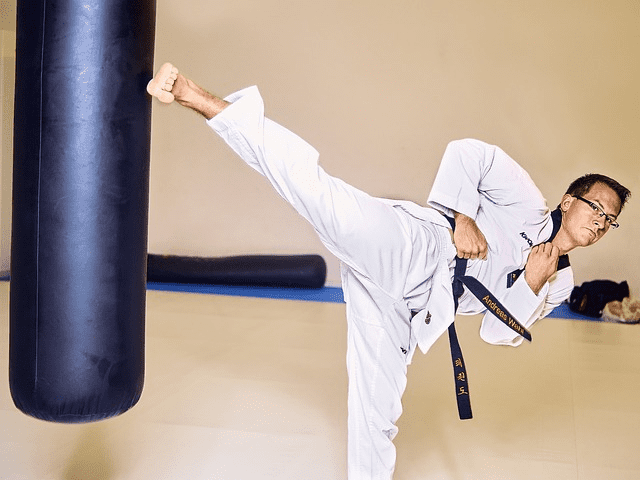The tenet is the set of principles, opinions, or doctrines that a person maintains or holds as true. One could compare it to religious beliefs – for example, you don’t look for proof of existence, you’re accepting the specific rules and adjust your life towards them.

There are five tenets of Taekwondo that martial artists should follow – courtesy, integrity, perseverance, self control, and indomitable spirit.
The 5 Tenets Of Taekwondo
Taekwondo is all about the foundation of good sportsmanship. There is no room for unsportsmanlike conduct in Taekwondo. It teaches you to be a good athlete by respecting the five core tenets:
- Courtesy: be polite and respect others, and behave in a well-mannered and civil fashion.
- Integrity: Taekwondo students should show honesty, prudence, decency, and good character, plus behave morally and ethically correctly.
- Perseverance: Fellow students should pursue a course of action, ignoring difficulty, discouragement, or resistance along the way.
- Self control: Students should exercise control in their expression, and develop the ability to keep desires, impulses, and emotions in check.
- Indomitable spirit: nobody can break or conquer the spirit of Taekwondo students, the strength comes from the inside.
Congrats, you know the basics, now let’s deep dive into the world of five tenets! It’s time to get to know more about respect, control, true martial arts, and a lot more. All the tenets have one thing in common – do not misuse Taekwondo if you’re a serious student!
Courtesy (Ye Ui)

Courtesy, or 여의 in Korean Hangul (pronounced ye-wee), means showing respect to everybody in the training area or Taekwondo school (instructors, sparring partners), and all other people that you meet outside of the formal training.
One should behave correctly all the time, but here is a brief set of instructions on showing courtesy:
- Be polite to one another, encouraging a sense of humanity and justice.
- Promote the spirit of mutual concessions.
- Respect others’ possessions and behave yourself according to etiquette.
- Stick to strong moral principles, and handle matters with sincerity and fairness.
- Always refrain from giving or accepting gifts when you’re in doubt.
Courtesy also relates to important aspects of everybody’s life that could lead to a more peaceful world. Unfortunately, the majority of regular people are not Taekwondo students, but everybody should learn a lesson on correct etiquette.
Let me give you one example – when you visit a dojo, you’ll be impressed by the way senior students behave toward instructors. I bet you’ll be heavily influenced by their rule set after spending some time among senior ranks.
Integrity (Yom Chi)

Integrity, or 염치 in Korean Hangul (pronounced yom-chee), means that you should be able to determine the difference between wrong and right, plus you should be willing to stand up for everything that is ethically correct. Honesty, and staying true is the best policy. Here is the list of things an instructor should never do:
- Misrepresenting himself, showing improper techniques due to lack of skillset and apathy- it can’t be integrity;
- “Fixing” breaking materials (for example, softening up the wood)- it’s not integrity, it’s cheating.
- False flattery and an expensive training hall in exchange for the lack of knowledge.
- Promoting martial art for materialistic gain.
The student can also make a foul in two examples. The first one is when he asks about the Taekwondo Belts: Ranking System Explained” target=”_blank” rel=”noopener”>black belt or any better ranking from an instructor. The second one is when the student gains rank for ego purposes or to feel more powerful.
Achieving integrity and honesty in all aspects of life is a huge challenge, especially in today’s society, but a real fan of traditional Korean martial art should do it!
Perseverance (In Nae)
In Korean Hangul, the syntax 인냬 (pronounced een-nay) refers to the third principle of Taekwondo practice. The patient person usually gets happiness and prosperity, one must set his goal to constantly persevere. The persistent and dedicated person will more likely reach her goal at one point in her life.
In Taekwondo training, one of the most important aspects of the game is to overcome difficult situations through perseverance. This can reflect all types of martial arts training – Muay Thai, kickboxing, MMA… If you back down or stop after one injury, then you cannot stay persevere – you’re a coward with a weak mindset.
The student of Taekwondo can show perseverance in many actions – when he prepares for competition, Kup or Dan grading, or trying to perfect the fundamental movement pattern and improve the power of the strike. Even when he goes for a long run or just improves a specific skill. All those tasks demand a strong mindset and following the principles of Taekwondo – in this case, perseverance.
Self Control (Ye Ui)

Self control, or 극기 in Korean Hangul (pronounced gook-gee), in general definition, means that you must be able to control your actions and behavior. You should be able to keep pure mind and body in all kinds of situations – you are allowed to use Taekwondo only for self defense when there is no other way around it.
For example, the loss of self control in a black belt sparring session could lead to disastrous injury, Tae Kwon is one of the martial arts with the most dangerous kicks, you could break your sparring partner’s ribs or jaw.
The amount of power a student develops can be lethal, especially when it lands at the sweet spot. Full-contact sparring should only happen in the competition thanks to the self control rule – you can’t kick random people in the street.
The importance of self control tenet matters both inside and outside of dojang. According to Lao Tzu, “the term ‘stronger’ refers to the person who wins over oneself rather than someone else”.
Indomitable Spirit (Baekjul Boolgool)
Indomitable spirit, or 백절불굴 in Korean Hangul (pronounced beckjool boolgool), might be a bit harder to define.
You should be a courageous person, stand up for your beliefs, plus you should stay strong in your convictions and beliefs, no matter what the odds against you might be. You should give 100% of yourself in training and life. You don’t understand one of the core values, do you?
Well, the serious student should stay modest and honest, and pursue his dreams strenuously and earnestly. The ones who patiently march towards their goals with an indomitable spirit rarely fail to accomplish the mission.
The indomitable spirit is essential for the moral, physical, and spiritual growth of a Tae Kwon athlete, but this could work for all martial arts.
Now let me give you an example from history. Do you remember three hundred Spartans who were heavily outnumbered by the Persian army, but failed to retreat despite overwhelming odds? The odds were heavily against them, but they fought the superior forces with the help of an indomitable spirit.
The Student Oath In Relation To The 5 Tenets Of Taekwondo
There are five important rules Tae Kwon students should follow in their daily lives:
- Observe the tenets of Taekwondo.
- Respect instructors and senior students.
- Never misuse Tae Kwon in the street or torture people, you can only use martial arts to defend yourself.
- Try to be the champ for freedom and justice by any means necessary.
- Try to build a more peaceful world.
Are you following all five? You can’t be on the wrong path lads, your path is 100% right! It will lead to spiritual, mental, and skill growth for sure!
Why Are Tenets Important In Taekwondo And In General In Martial Arts Training?
Tae Kwon’s tenets can help you grow and develop in real life. Martial arts training leads to a better mood, but following the specific tenets might help you live healthier and become a better person.
It will keep you away from stealing, street, potential crimes, and bad and problematic people. Your working ethic will get better, you might become one of the best workers in the company if you’re an honest and honorable person.
A good person holds a greater amount of responsibility, bosses rather choose to trust one’s attitude. Pair a former prisoner and a person who applies Tae Kwon tenets in daily life. What do you think, who is going to get the advantage on the pre-work interview?
Tae Kwon students are learned to never surrender or backpedal, they will fight and achieve something – backing down is simply not an option. In Tae Kwon, you learn to develop an inner strength to solve problems. Also, if you respect your instructor, you will show respect towards your colleagues and teammates too.
Just as you are advised to respect your instructors and colleagues, the same level of care applies to your physical well-being – incorporating top Taekwondo shoes into your training regimen is a paramount step in promoting safety and hygiene alongside the respect and discipline of the tenets.
Martial arts should turn you into a calm and honest person with the ability to solve the greatest problems and stand up for yourself.
lack belts mostly resolve problems without much stress and tension, they develop this ability in the training session – they become one with Tae Kwon as time goes by.
Who Is The Buddhist Monk That Laid Out A Five Principle In Taekwondo?
The Buddhist monk Won Kang incorporated a five-point code of conducting oneself to help soldiers guide themselves and give purpose to their knighthood. His set of rules looked like this (very similar to Tae Kwon tenets):
- Be loyal to your king.
- Be obedient to your parents.
- Be honorable to your friends.
- Never retreat in battle.
- Make it just kill.

